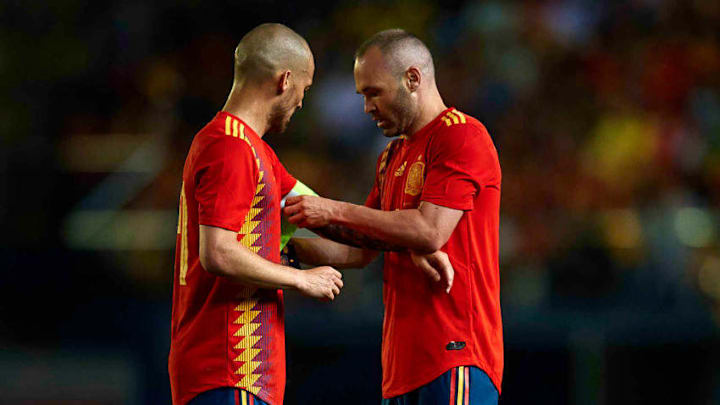Spain’s bid for a second World Cup trophy may depend on how manager Julen Lopetegui addresses some familiar off-pitch questions.
It’s been eight years since Spain lifted the World Cup in South Africa, the crowning achievement of their glittering treble of major international trophies from 2008 to 2012. Since their triumph at Euro 2012, a nightmarish World Cup defense in Brazil and distinctly average run at Euro 2016 led La Roja to change course, bringing in Julen Lopetegui to replace Vicente del Bosque. The former Spain U-21 manager has freshened things up considerably, mingling another potential golden generation of talent with a core of established stars.
The likes of Isco, Marco Asensio, Saul Niguez and Alvaro Odriozola have all entered the Spanish ranks. Even the traditional problem area up front remains an issue only due to the plethora of attacking talent Lopetegui has at his disposal. The turnover means just six of the side that won the World Cup in 2010 remain in the squad, and one of them, Pepe Reina, is a backup keeper. Only 11 players made the squads for both Euro 2016 and this World Cup. It’s a remarkable validation of the Spanish system that La Roja could go from a limp round of 16 exit in France to serious World Cup contenders in a span of 18 months.
Naturally, this has led to heightened expectations from the media and fans at homes, who wonder whether a second World Cup in Russia could usher in another period of dominance, only six years after the last one ended. It’s dangerous talk, especially at such an early stage, something Lopetegui has been quick to play down: “I’ve always said the same thing: comparing generations will not help us win games.”
The Spanish national team are no strangers to pressure — it wasn’t so long ago they were notorious for collapsing under the weight of expectation — but this is a new and unique pressure, the pressure of past success, and not just a single title, but an almost unprecedented period of dominance. Very few teams have been able to emulate the success of their predecessors in such a short space of time. The good news for Spain is that the countries who have been able to succeed over long periods have done so by emphasizing continuity and promoting from within.
Having said that, while Spain will be led by a group of players who know what it takes to succeed on this stage — the likes of Andres Iniesta, Sergio Ramos, Gerard Pique and Sergio Busquets — 10 of the 23-man squad have never competed at a major international tournament with the senior side. That injection of youth helped them breeze through qualifying, winning nine of 10 matches while scoring 36 goals and conceding only three, but there’s no way of knowing how some of the less experienced players will handle the pressure of competing on the World Cup stage.
There are also off-pitch issues to contend with, with the consequences of last October’s Catalan independence referendum still playing themselves out. It’s a long and complicated tale, but the short of it is that after the initial violent response to the referendum by the Spanish authorities, the central government has taken control of the Catalan region, with the local politicians who organized the vote either in custody or exile.
Next: The best player on every team at the World Cup
The subject of politics is never far away from Spanish soccer. Sometimes this is a positive, as it was in 2010, when the country united behind the team. Sometimes it’s used as an explanation for La Roja‘s failure. And so while this isn’t something the senior members of the squad haven’t experienced before, the current situation is precarious, especially given the outspoken nature of some of the squad and Lopetegui’s relative lack of experience.
Tensions have cooled since the referendum, but after Spanish prime minister Mariano Rajoy was ousted from his position following a vote of no confidence at the beginning of June, to be replaced by Socialist party leader Pedro Sanchez, there’s potential for upheaval ahead of the World Cup. The Catalan independence question is reportedly at the top of the new government’s agenda, and with Catalan parliament returning on Saturday, it’s not impossible political events back home impact La Roja in Russia.
Spain will be determined to put the politics to one side and concentrate on winning. That focus was a feature of the squads of Lopetegui’s immediate predecessors and, despite an influx of new faces, is a quality the likes of Iniesta, Ramos and Pique will hope to instill in the younger generation. Nonetheless, these are headaches Lopetegui would presumably prefer not to have to deal with. If he can ensure Spain leave off-pitch factors off the pitch, he leads a side capable of making history in Russia.
